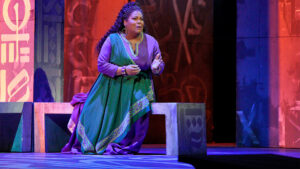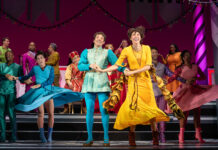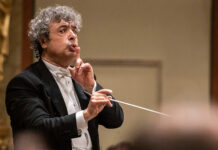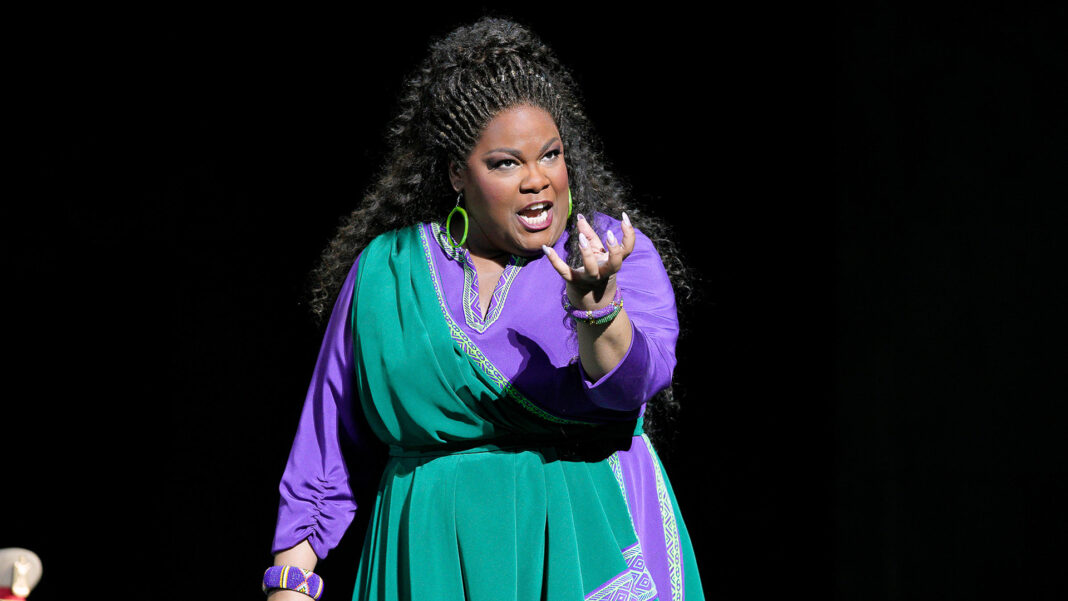There’s a stereotype of opera singers, particularly women, that they are divas. That they can be very quiet and reserved. While that hasn’t usually been my experience, nothing prepared me for soprano Latonia Moore’s reaction when I told her that I had never seen a production of Aida in person and that I will finally do so on Saturday at LA Opera’s opening night of Verdi’s masterwork. Her response? “I’m going to pop your Aida cherry!”
Moore is playing the title character in this Francesca Zambello production that is the first Aida to be performed at LA Opera in over 15 years. She’s very familiar with the part having first performed it in 2009. Moore made her Metropolitan Opera debut in the role in 2012 as a last-minute substitute for Violeta Urmana who was sick.
Since then, in addition to Aida, she’s regularly performed the role of Cio-Cio San in Madama Butterfly and was seen in the Met Opera productions of Gershwin’s Porgy and Bess and Terence Blanchard‘s Fire Shut Up In My Bones. Italian operas are her passion, but as you’ll see from this interview, her jazz background earlier in her life has been the gift that keeps on giving.
What follows are excerpts from our conversation earlier this week that have been edited for length and clarity.
You’re 13 years into singing this part and 10 years after your Met debut as Aida. What’s your relationship to Verdi’s opera today?

When I first started doing the role, I didn’t know if that was really for me vocally. I thought my voice was a bit light for it. So as the years went on, I started getting more [performances] added. I was doing it all over the world. The more I did, the deeper I fell into the character. By about 2016 my voice caught up with where I should be vocally with the character.
Every time I do it I find something new. I tend to put my own stamp on it and try to break away from the traditional way of doing it and singing it and provide the audience with something they’re not used to hearing. I feel like such a staple like this is done mostly one way for so many years. Every time I go out on the stage, even within a production – even within one performance – I like to spice it up and do something that’s more Latonia.
What have you learned or discovered about the character in that time?
Aida, you really hear about who she really is and her struggle and things like that. But one thing that I’ve learned about a character like hers is she’s a lot more like her father than I ever thought. She’s very much an outsider. The more I delve into the text and the way I’m singing and the way I’m saying words, it’s becoming a lot more visceral than it ever was before. She’s the daughter of a warrior, she’s been trained to fight, she knows how to do it. She’s an animalistic person by nature, but has been forced to seem like something submissive. She actually is not and I think that I’ve embraced more of the power of a person like that.
In previous interviews you’ve discussed your concern that you were only being cast in Aida because you are Black. Do you still feel that way?
I still believe that, especially initially, it was definitely the color of my skin, because vocally I was not right for Aida when I first started doing it. The people who hired me knew that, but they didn’t care because they wanted someone Black. I started to wrap my head around the fact that maybe I was being cast for Aida because I was appropriate for the role was four years after my Met debut. I was just like, you know what? I’m a pretty good Aida. This actually fits now, but it didn’t before. Maybe it took having a couple kids for my voice to settle into it a a little more and then make it a bit deeper of a sound for Aida.
Do I still think that people cast me because I’m Black? Yes. I think that’s why I’m here in L.A. I don’t think that it was only because I’m a good Aida. I think they wanted to cast a good Black Aida. And hopefully that’s what they got. But yes, that’s the factor here because I’m Black and I think that continues to be. I think that for many companies, especially in this climate, they’re just like we have to cast the Black Aida because, you know, we don’t want any pushback for it. You know, casting a white Aida right now in the climate here in America, it’s dicey.
Does that become limiting for you and the roles you can play?
This is where I’ve become a bit up in arms with the casting, because I see where they’re coming from. You know, it’s like they have to have a Black Aida. But does that mean that I can’t be Madame Butterfly anymore? That it has to be an Asian one? Because my whole reason for getting into the business was so I could be someone Japanese. I could be a Venetian. I played Leila in The Pearl Fishers, a Sri Lankan. That’s what I love about an art form like this that is so exotic and I can transform into anything. So when people are saying, yes, we should cast a Black Aida, you know, that doesn’t sit right with me because it feels like where I’m then limited.
The moment everyone is waiting for in Aida is o patria mia. What’s your approach before and during the singing of this aria?

Any soprano that sits there and says they’re not thinking about it; I think one of two things about that. Either one, they have done therapeutic things to change their mindset or two, they’re lying to try to convince themselves that it’s not torture. Every single soprano, and this is for everybody that’s about all these sopranos, we all know y’all are thinking about it, too. Surely Maria Callas, when she got there, started thinking and you can hear it. You can hear the people start thinking about it. You can’t completely throw caution to the wind because there’s a lot riding on it. What’s giving everybody so much anxiety about it is exactly what you said – the expectation. It’s that everybody’s waiting on you to stick the landing. To this day it will always terrify me. Always. I’m not going to sit here and pretend Oh, no, I’ve mastered it. No, no, no. I’m going to go to my grave having never mastered that part of it.
I do feel like one difference between the way I used to think about o patria mia and now. Now I’m not so focused on whether or not I stick the landing. Either it’s going to happen or it’s not, but I have to use this character to my advantage no matter what. A lot of times people are expecting it to sound like something off a recording that they heard. Can she do it like Leontyne Price? Can she do it like Zinka Milanov? I’m never going to be able to do it like them. However, you know what I am able to do that maybe not a lot of people are able to do is convince you that I am that person doing it. Even if I crash and burn and bust all over the high C it’ll still be Aida doing it, not Latonia. So that’s one thing that I had to retrain my brain about it. No matter what I end up doing, if she’s going to bust a note, she’s busting it because Aida wanted to.
How would you compare the joy that you get in singing a classic role like Aida or singing Madama Butterfly to the opportunity to sing new work like Fire Shut Up in My Bones?
I’ve always thought of myself as an Italian soprano, one that just focuses mostly on Italian opera. However, I have a big jazz background and I switched to opera while I was in college. But jazz is really my focus. I don’t particularly like singing in English, but what was so appealing about these works, like Fire Shut Up in My Bones and the upcoming Champion, is that they are jazz operas. And this goes for Porgy and Bess, too. It goes back to me saying that Leontyne was beamed down for the planet to sing Aida. That’s what she was here for. I feel like the reason I started in jazz and came into the opera the way I did was for the work that I’m doing right now on Fire Shut Up in My Bones and stuff like Porgy and Bess, Champion and whatever comes in that vein.
I love Italian opera. I’ll never give it up if I can help it. But some people fit right in the pocket of something. I’m the one that fits in the pocket of being the soprano in these Black jazz operas. I guess I find myself on the planet at the right place, right time. I feel like it’s what I was meant to do.
On your Instagram account earlier this year, you quoted Charles M. Blow’s memoir that served as the inspiration for Fire Shut Up in My Bones. You quoted, “I would have to learn to accept myself joyfully, fully as the amalgamation of both the gifts and the tragedies of fate as the person destiny had chosen me to be.” So today, Latonia, in 2022, who is the person destiny has chosen you to be?
I’m a beautiful example of somebody that may be viewed as an underdog, but an example of somebody that no matter what you look like, no matter what you’ve gone through or what you said, you still persevere. I feel like I’m here to be an example to other people.
I hope that every other kid like me sees what I’m doing and knows that they can do it, too. I feel like my place in a business like this is to show you that what you look like as a person will never matter more than what it is you can create as an artist. I’m simply put here to create and make art for people, to encourage them, to hear them, to show them that they can do it. Yes, you can have children. Yes, you can go up there and you can look like anything and transform into something else. Yes, you can go up and help the youth and you can help them lift up into a great career.
I feel like I’m a very good example in this business of what perseverance can really get you. I’m the sort of person that is like if you streamline your energy toward what you want and you believe it with unwavering faith, you’re going to make your mark. Period. But it has to be unwavering faith. Be patient and don’t care how long it’s going to take. It’ll happen.
There are six performances of Aida at LA Opera from May 21st through June 12th
All photos of Latonia Moore in LA Opera’s production of Aida by Cory Weaver. (Courtesy LA Opera)










